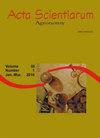Combining ability and potential of s1 popcorn progenies for early selection
IF 1.2
4区 农林科学
Q3 AGRONOMY
引用次数: 0
Abstract
Evaluation of combined ability can eliminate lines that are inefficient and enable the subsequent program steps to be more successful. The objective of this study was to predict the general (gi) and specific (sij) combination ability of popcorn S1 progenies for early selection. A total of 288 topcrosses were performed under a randomized complete block design with two replicates at two sites (Campinas and Capão Bonito, São Paulo State, Brazil). Diallel analyses were performed using mixed models and the maximum likelihood restricted/best unbiased linear prediction method. Evaluated traits included grain yield (GY; kg ha-1), weight of 100 grains (g), and popping expansion (PE; mL g-1). Ear components were also evaluated, including ear length, ear diameter (cm), and the number of grain rows (unit). The S1 progeny 32 presented the highest gi for GY in Campinas, whereas progeny 46 presented the highest gi for GY in Capão Bonito. The S1 progeny, 114 was an important parent for the popcorn breeding program, because it presented high gi for the traits of agronomic interest at both sites. Combination 86×IAC12 exhibited a high sij, and the 86 parent presented the second-highest gi for PE in Campinas, and it should be used for high PE genotypess1粒爆米花后代早期选择的配合力和潜力
对组合能力的评估可以消除效率低下的行,并使后续的程序步骤更加成功。本研究的目的是预测爆米花S1后代的一般配合力(gi)和特异配合力(sij),为早期选择提供依据。采用完全随机区组设计,在两个地点(巴西圣保罗州Campinas和cap o Bonito)共进行了288次顶杂交。采用混合模型和最大似然限制/最佳无偏线性预测方法进行双列分析。评价性状包括产量(GY;kg ha-1)、百粒重(g)、爆胀(PE);毫升g1)。对穗长、穗径(cm)、穗行数(单位)等组成进行了评价。S1子代32在坎皮纳斯的GY值最高,而子代46在卡普奥博尼托的GY值最高。S1代114在两个位点均表现出高gi的农艺感兴趣性状,是玉米育种的重要亲本。组合86×IAC12具有较高的gi值,86亲本的PE gi值在坎皮纳斯地区位居第二,应用于高PE基因型
本文章由计算机程序翻译,如有差异,请以英文原文为准。
求助全文
约1分钟内获得全文
求助全文
来源期刊

Acta Scientiarum. Agronomy.
Agricultural and Biological Sciences-Agronomy and Crop Science
CiteScore
2.40
自引率
0.00%
发文量
45
审稿时长
>12 weeks
期刊介绍:
The journal publishes original articles in all areas of Agronomy, including soil sciences, agricultural entomology, soil fertility and manuring, soil physics, physiology of cultivated plants, phytopathology, phyto-health, phytotechny, genesis, morphology and soil classification, management and conservation of soil, integrated management of plant pests, vegetal improvement, agricultural microbiology, agricultural parasitology, production and processing of seeds.
 求助内容:
求助内容: 应助结果提醒方式:
应助结果提醒方式:


